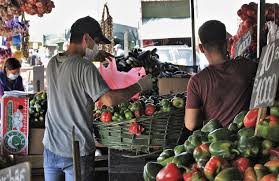Training Course on Food Authentication and Fraud Prevention in Agri-Food Trade
Training Course on Food Authentication and Fraud Prevention in Agri-Food Trade equips stakeholders with the latest tools, regulatory updates, and analytical methods to combat fraud and reinforce food integrity.

Course Overview
Training Course on Food Authentication and Fraud Prevention in Agri-Food Trade
Introduction
In today’s globalized agri-food trade, ensuring food authenticity and preventing food fraud are critical to safeguarding public health, protecting brands, and sustaining market confidence. The increasing complexity of food supply chains has made traceability, quality assurance, and risk detection key priorities for food producers, exporters, regulators, and certification bodies. Training Course on Food Authentication and Fraud Prevention in Agri-Food Trade equips stakeholders with the latest tools, regulatory updates, and analytical methods to combat fraud and reinforce food integrity.
By integrating global standards, analytical technologies, and digital traceability systems, this course empowers professionals across the value chain to identify fraudulent practices, implement robust traceability systems, and stay compliant with international food safety regulations. Participants will engage with practical case studies, gain hands-on knowledge, and develop proactive strategies to reduce vulnerabilities to food fraud, ensuring market access, consumer trust, and product integrity.
Course Objectives
- Understand the definition and categories of food fraud in global agri-food systems.
- Analyze the economic, regulatory, and public health impacts of food adulteration.
- Identify emerging trends and technologies in food authentication systems.
- Explore analytical methods for detecting food fraud (e.g., spectroscopy, DNA analysis).
- Interpret food labelling laws and certification requirements across trade regions.
- Develop supply chain transparency and blockchain-based traceability solutions.
- Implement food fraud vulnerability assessments and risk mitigation plans.
- Strengthen compliance with Codex Alimentarius, EU, and FDA standards.
- Apply digital tools and smart technologies for fraud detection.
- Review case studies of major food fraud scandals and prevention strategies.
- Understand the role of third-party certification and laboratory accreditation.
- Formulate a proactive food fraud prevention plan for your organization.
- Build institutional capacity for food integrity governance and stakeholder training.
Target Audiences
- Food manufacturers and processors
- Quality assurance professionals
- Food safety auditors and inspectors
- Exporters and trade logistics personnel
- Certification and regulatory agencies
- Agricultural cooperatives and farmer groups
- Academic researchers and laboratory technicians
- NGOs and policy stakeholders in food security
Course Duration: 5 days
Course Modules
Module 1: Understanding Food Fraud and Authentication
- Types and drivers of food fraud
- Consequences for health, trade, and reputation
- Global fraud incidents and scandals
- Detection vs. prevention approaches
- Key terminology and fraud categories
- Case Study: The Horse Meat Scandal in Europe
Module 2: Regulatory Frameworks and Compliance Standards
- Codex Alimentarius guidelines
- EU and US FDA compliance
- Food labeling and claims regulation
- Country of origin labeling (COOL)
- Global Harmonization Initiatives
- Case Study: Mislabeled Organic Imports in the US
Module 3: Analytical Techniques in Food Authentication
- Spectroscopy and chromatography
- Stable isotope ratio analysis
- DNA fingerprinting in food
- Chemometric and statistical tools
- Limitations and cost considerations
- Case Study: Honey Adulteration Detection in Asia
Module 4: Digital Tools and Traceability Technologies
- Blockchain and digital ledgers
- IoT sensors in agri-supply chains
- QR codes and smart labeling
- Data integrity and cybersecurity
- Cloud-based audit systems
- Case Study: Blockchain Traceability in Olive Oil
Module 5: Fraud Risk Assessment and Prevention Planning
- Conducting vulnerability assessments
- Mapping critical control points
- Designing a food fraud mitigation plan
- Early warning indicators and monitoring
- Internal audits and continuous improvement
- Case Study: Fraud Prevention Plan in a Dairy Firm
Module 6: Certification and Third-Party Verification
- Importance of third-party audits
- ISO/IEC 17025 and lab accreditation
- Role of certification bodies (e.g., BRCGS, GFSI)
- Consumer-facing certification labels
- Challenges in verification and compliance
- Case Study: Certification Compliance in Coffee Exports
Module 7: Consumer Trust and Communication Strategies
- The role of branding and transparency
- Managing crisis communication during scandals
- Educating consumers on food authenticity
- Social media and reputational risk
- Building loyalty through verified sourcing
- Case Study: Brand Recovery Post-Fraud in Baby Formula
Module 8: Institutional Capacity and Policy Building
- Role of governments and institutions
- Policy frameworks for national food fraud control
- Training programs and public-private partnerships
- Research and innovation for food integrity
- Stakeholder engagement and advocacy
- Case Study: Government-Led Initiative in Kenya on Maize Fraud
Training Methodology
- Interactive lectures and expert presentations
- Hands-on sessions with analytical tools
- Real-world case study reviews
- Group exercises and action planning
- Policy simulation and role-play activities
- Pre- and post-course assessments
Register as a group from 3 participants for a Discount
Send us an email: info@datastatresearch.org or call +254724527104
Certification
Upon successful completion of this training, participants will be issued with a globally- recognized certificate.
Tailor-Made Course
We also offer tailor-made courses based on your needs.
Key Notes
a. The participant must be conversant with English.
b. Upon completion of training the participant will be issued with an Authorized Training Certificate
c. Course duration is flexible and the contents can be modified to fit any number of days.
d. The course fee includes facilitation training materials, 2 coffee breaks, buffet lunch and A Certificate upon successful completion of Training.
e. One-year post-training support Consultation and Coaching provided after the course.
f. Payment should be done at least a week before commence of the training, to DATASTAT CONSULTANCY LTD account, as indicated in the invoice so as to enable us prepare better for you.